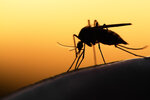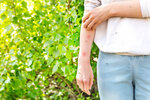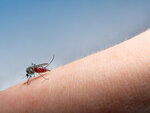If you live on the Gulf Coast, you should worry less about shark bites and far more about mosquitoes. The bane of outdoor lovers worldwide, and the butt of camping jokes, this tiny nuisance also …
This item is available in full to subscribers.
Please log in to continue |



If you live on the Gulf Coast, you should worry less about shark bites and far more about mosquitoes.
The bane of outdoor lovers worldwide, and the butt of camping jokes, this tiny nuisance also carries a heavy title: the "world's deadliest animal."
It's no joke.
The U.S. Centers for Disease Control and Prevention anointed the insect with the moniker to help raise the alarm for humans everywhere to take precautions against this teeny enemy.
In places like the United States where mosquito-borne disease is rare, and deaths even rarer, it can be difficult to comprehend.
But mosquitoes are responsible for more than 1 million deaths a year around the globe, possibly as many as 2-3 million. Over the course of human history, that equals more than 50 billion deadly wins for the mosquito.
Meanwhile sharks kill about 10 people a year. And if you stay out of the water, you are guaranteed not to join that statistic.
Mosquitoes, however, are everywhere.
This summer, Baldwin County was delivered a heart wrenching reminder of the danger.
In July, a 7-year-old Spanish Fort girl died after contracting a rare disease from a mosquito bite – Eastern equine encephalitis (EEE).
The Alabama Department of Public Health confirmed there was a second case of the disease in Baldwin County as well.
Was it a rare case? Experts say absolutely.
But should places like the U.S., normally protected from mosquito-borne disease by the onset of freezing temperatures, worry it will begin to happen more often?
Experts say, again, absolutely.
In journals and interviews given by every major health organization from the CDC to the World Health Organization, scientists are wringing their hands in concern over the spread of the insect into traditionally colder regions as the planet warms.
Less cold weather days, especially those with freezing temperatures, mean the mosquito can continue to move from creature to creature for longer periods of time and potentially spread more disease.
"The problem we have is that we are getting warmer, as you can tell," said Jonathon Raynor, associate professor of microbiology and immunology at the University of South Alabama.
Two days prior to this interview, Mobile set a record high temperature of 106 degrees, breaking the previous mercury burst of 105 degrees set in August of 2000.
"The longer we go between freezes, the longer the mosquitoes can be active. As we see temperatures increase for longer periods of time, the risk of mosquito borne transmission increases," he said.
With each breath you push out of your lungs, you call to mosquitoes.
The insects are attracted to the carbon dioxide that floats in the air you exhale. When you feel their pinch, it is always a female who has taken a bite. Only females drink blood – from humans, horses, birds, nearly any animal.
And there is no limit to the number of times one mosquito can bite their victim. According to researchers at the University of Melbourne, she will bite until she is full. While males do not bite, the university's report assures that they are "just as annoying" buzzing about to be close to the females as they work.
When a mosquito bites an animal that is infected with a disease such as EEE, the virus develops and multiplies inside the insect.
The disease is spread to other animals the insect bites through its saliva. By passing on the virus, the mosquito acts as a vector of the disease.
EEE is normally found in horses. Human cases are rare.
In both horses and humans, the disease causes swelling of the brain. Its fatality rates are high. There is no vaccine. For creature or human.
But this is just one of the diseases the mosquito carries. There is also West Nile Virus, dengue, malaria, Zika, Chagas disease, Chikungunya fever, St. Louis Encephalitis, Rift Valley fever and yellow fever.
In 2015, the Zika virus emerged in North and South America after being secluded mostly to Africa and Asia. WHO declared a Public Health Emergency of International Concern as the virus was found to cause pregnant women to deliver infants born with congenital malformations.
As quickly as it appeared, the disease disappeared. There have been no confirmed Zika virus cases in the U.S. since 2019.
West Nile Virus is the most common virus spread by mosquitoes in the continental U.S. and first appeared in New York in 1999.
In 2023, 552 cases were reported across the United States with zero in Alabama, though there was at least one case in every surrounding state.
Malaria, however, has been found in the U.S. since the time of Christopher Columbus. Roughly 2,000 cases are diagnosed across the nation each year, nearly all carried in by international travelers.
So far in 2023, six malaria cases have been discovered in Alabama, and each was deemed acquired out of state by the Alabama Department of Public Health.
What worries health officials is that eight locally acquired, mosquito-transmitted cases of malaria occurred in Florida and Texas for the first time in 20 years this summer. Meaning people who never left their hometown caught the disease.
Meanwhile, other nations are reporting thousands of cases of each of these diseases and thousands of deaths.
In July, WHO warned of a dengue outbreak worldwide, the most common viral infection that spreads from mosquitoes to people.
Scientists with the organization recorded half a million cases in 2000 and 4.2 million cases in 2022.
While communities across the world grapple with these diseases the U.S. remains relatively untouched, comparatively.
Climate change is good for mosquitoes.
In an interview with Stanford University news last month, infectious disease experts explained that yes, as the planet warms and cooler regions stay hot longer, it gives mosquitoes more time to be active. It also allows them to reach further into previously untapped regions.
But it's not that simple.
Humans have more than heated the planet. The insects breed in piles of trash, they thrive in cities. Mosquitoes can survive flood and drought.
As different types of mosquitoes carry different diseases with different hosts and habitats in different places around the planet, scientists are seeing an intensity in outbreaks.
Ultimately, some scientists say, there is one underlying cause.
"Climate change is impacting all these multiple layers of the transmission cycle," Eloise Skinner, a senior scientist at Stanford told the publication.
While other nations bury thousands of dead, the U.S. death toll due to mosquitos is relatively small. In 2022, just 79 U.S. deaths were attributed to mosquitos.
What is different about mosquito-borne diseases in the U.S. is that most communities have a public health system, Raynor said.
"Mosquito-borne infectious diseases in the continental U.S. typically aren't as significant, as say, tick-borne diseases. The reason is because our public health infrastructure is generally better," he said. "We have mosquito abatement programs that help to limit the number of mosquitoes and houses with air conditioning and screens on the windows and stuff that ultimately helps stop the mosquitoes from getting into the house.
"When we go to some place like South America where a lot of people are living in makeshift homes with no air conditioning and no screens, mosquitoes are coming inside and feeding on them at night," Raynor said.
As an infectious disease research scientist, Raynor screens mosquitoes in Mobile County for the presence of viruses.
While they found evidence of EEE in July, Raynor said it is typical this time of year to find evidence of the disease in nature.
It is regularly transmitted between birds and mosquitoes. Transmission of the disease to a human is rare, he said, but unfortunately, not impossible.
The best way to stop the disease he said, is to stop the mosquito.
"We need to do what we can to protect ourselves from being fed on by mosquitos," he said. "There is no vaccine and no way to treat this infection. The best way to prevent significant disease is to prevent being fed upon."
While citronella candles are nice, they are only effective for those sitting directly in their smoke. Raynor suggests planting citronella plants around the yard to help steer the insects away.
And standing water of any amount needs to be removed.
"As soon as we get a storm those little puddles will fill back up and it doesn't take long for eggs to hatch and go through their stages and start producing mosquitoes."